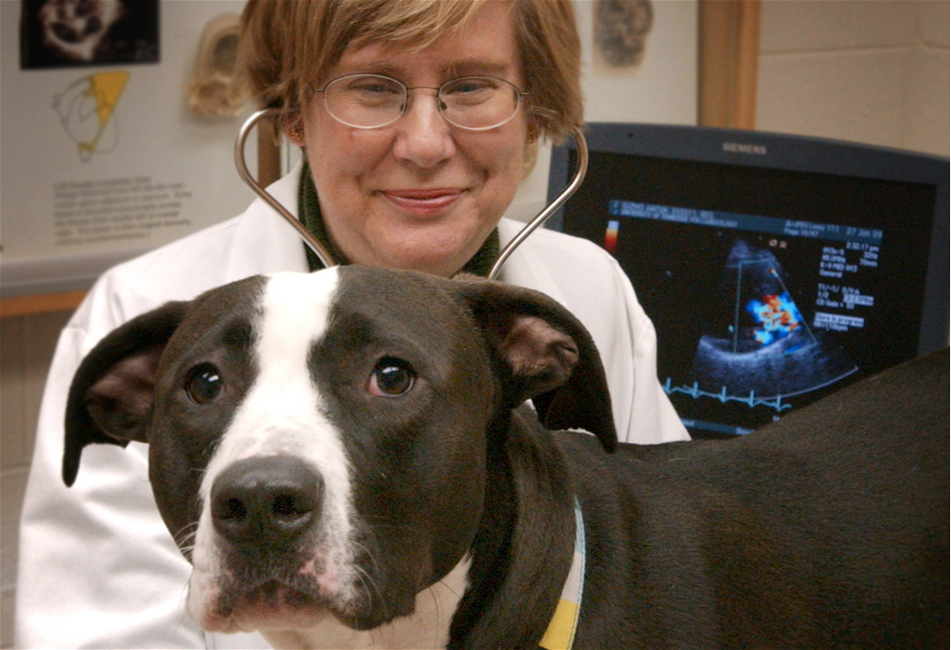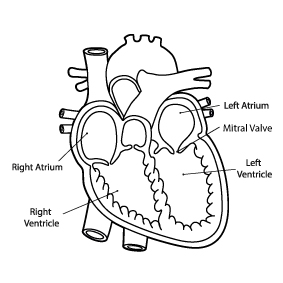

Search Help
Enter a country to search internationally or a city/state or zip to search within the US. If you select a country it will search only within that country. If you select only a state it will only search within that state. If you search for a zip code or city/state combo it will search within a proximityWhat is a Board-Certified Veterinary Cardiologist?
A Veterinary Cardiologist is a specialist that has advanced training in the heart and circulatory system.
To become a Board-certified Veterinary Cardiologist, a veterinarian usually completes a one year internship followed by extensive specialized training in an approved residency training program (usually 3-5 years). Most Veterinary Cardiologists work with small animals; however, some specialize in large animals, including horses and cattle.
What conditions do Veterinary Cardiologists treat?
Board-certified Veterinary Cardiologists focus on diagnosing and treating diseases of the heart and some lung conditions, which include:
- Congestive heart failure (CHF)
- Heart muscle disease (Dilated cardiomyopathy or hypertrophic cardiomyopathy)
- Age related changes to the valves of the heart (Degenerative mitral valve disease)
- Coughing and other breathing problems
- Congenital (present at birth) heart defects
- Cardiac arrhythmias (problems with the rate and/or rhythm of your animal’s heart)
- Diseases of the pericardium (sac surrounding the heart)
- Cardiac tumors
- High blood pressure (hypertension)
- Pulmonary hypertension (high blood pressure in the lungs)
Veterinary Cardiology Specialists will perform a complete and thorough physical examination on your animal, and based on these initial findings, additional tests will be discussed. They will also review your animal’s past history and current medications. Depending on your animal’s condition, diagnostic testing or treatments may include:
- Echocardiography (sonogram) – non-invasive ultrasound imaging of the heart
- Electrocardiography (ECG) – non-invasive electrical reading of the heart’s rhythm
- Blood pressure evaluation
- Holter monitor – 24 hour ECG performed at home
- Radiography (x-rays) of the chest and lungs
- Surgical repair of congenital heart defects
- Cardiac catheterization procedures
- Balloon valvuloplasty to dilate narrowed valves
- Pacemaker implantation for animals with too slow of a heart rate
- OFA Heart Registry Certification for breeding programs
How do Veterinary Cardiologists work with your primary care vet?
Board-certified Veterinary Cardiologists are an integral part of your animal’s health care team from the time a potential cardiac abnormality is noted. Early diagnosis and appropriate therapy of cardiac conditions helps your animal live a longer and healthier life. They work closely with your primary care veterinarian to ensure your animal’s optimal health. While some cardiac conditions require hospitalization, most conditions can be managed on an outpatient basis by a Board-certified veterinary cardiologist along with your primary care veterinarian.
Many Veterinary Cardiology Specialists practice in veterinary teaching hospitals or large referral clinics and are contributing to clinical research programs that aim to improve the cardiac health of animals. Veterinary Cardiology research is essential to identify new diagnostic tests and treatments for cardiac conditions in animals and even humans.
Veterinary education is also important to the Veterinary Cardiologist. From training veterinary students to providing continuing education courses to veterinarians and to training future board certified cardiologists, cardiology specialists are often involved in improving veterinary knowledge and understanding of the cardiac and circulatory conditions.
...
Find a Board-certified veterinary cardiologist using our search tool!
Edited by:
Rebecca Saunders, DVM, DACVIM (Cardiology)
April, 2020
Myxomatous Mitral Valve Degeneration in Dogs
What is degenerative mitral valve disease?
Degenerative mitral valve disease (DMVD—also called myxomatous mitral valve degeneration) is the most common type of acquired heart disease in older dogs. The first sign of this disease is usually a heart murmur heard with the stethoscope by your primary care veterinarian.
DMVD can affect all four valves of the heart but the mitral valve is most affected. DMVD primarily affects older, small breed dogs but can also affect some larger breed dogs. Some smaller breed dogs can be affected earlier in life than others with the Cavalier King Charles Spaniel and Chihuahua being the most common breeds of dogs diagnosed with DMVD.
What is the mitral valve?
The mitral valve: 
- Is located between the left atrium (upper chamber) and the left ventricle (lower chamber) of the heart
- Permits blood flow from the left atrium into the left ventricle but not in the reverse direction
- Has two leaflets or flaps called cusps
- Is usually a very thin structure and is anchored in place by special ligaments called chordae tendineae
What happens when the mitral valve degenerates?
- Degenerative mitral valve disease (DMVD) occurs when the valve becomes thickened with formation of small nodules on the edges of the leaflets.
- This process is all genetic.
- It has nothing to do with exercise, obesity or diet.
- DMVD prevents complete closure of the two mitral valve leaflets/cusps.
- The result of the degeneration is blood flow in the wrong direction across the mitral valve back up into the left atrium. This backflow is called mitral regurgitation (MR).
- Over time, the left atrium and left ventricle start to enlarge due to the longstanding leak across the mitral valve up into the left atrium.
- As time progresses and the leak in the mitral valve worsens as the valve continues to degenerate, dogs can start to show signs of congestive heart failure (CHF).
What are the signs and symptoms of DMVD?
- A new heart murmur heard by a primary care veterinarian
- Cough
- Labored breathing
- An increase in a pet’s resting breathing rate that remains over 35 breaths per minute (a rise and a fall of the dog’s chest counts as one breath)
- Exercise intolerance
- Weakness
PLEASE NOTE: If your dog is experiencing coughing, labored breathing and/or a persistent increase in its resting breathing rate, they should be seen by your primary care veterinarian or an emergency veterinarian as these symptoms may indicate congestive heart failure of which can be a life threatening condition.
How is DMVD diagnosed?
If a primary care veterinarian hears a heart murmur in a dog or cat, they may refer the pet to be evaluated by a Board-certified Veterinary Cardiologist to have an echocardiogram (ultrasound of the heart) performed. This specialized ultrasound is the gold standard for definitive diagnosis of the cause of a heart murmur. The results of the echocardiogram will help the cardiologist determine what medications may be required to treat a pet. There are a few international centers that can perform surgery on the mitral valve, however, this is not standard or typical treatment now in veterinary cardiology.
How is DMVD treated?
After DMVD is diagnosed, treatment depends on whether a pet’s heart is enlarged. Recent studies have shown that medication will delay the onset of congestive heart failure (CHF) in dogs with moderate to severe secondary heart enlargement caused by the leak in the mitral valve.
A cardiologist will tailor treatment to both delay the onset of CHF and to treat the signs associated with congestive heart failure. Medications may include some or all of the following:
- Pimobendan (Vetmedin®)
- ACE inhibitor (enalapril, benazepril, lisinopril, etc.)
- Spironolactone
- Furosemide (Lasix® or Salix®)
- Anti-arrhythmia therapy (if indicated)
- Modified sodium diet
How often is follow-up recommended?
The frequency of follow-up is largely dependent on how severely a dog is affected by DMVD. However, it is usually recommended that a pet is rechecked with their cardiologist every 4-12 months. Blood work to assess kidney function and electrolytes is usually recommended within 2 weeks of starting any medication and every 3-6 months if the dog is maintained on heart medication. Rechecks with a cardiologists may involve both chest x-rays and/or repeat echocardiograms.
What is the prognosis for a dog with DMVD?
The prognosis for newly diagnosed DMVD varies widely. The average time from when a heart murmur from DMVD is first heard until congestive heart failure is present is approximately 3-4 years. However, the speed of progression of the disease is difficult to predict for individual patients and can be quite variable.
Once a patient has developed congestive heart failure, the average survival time is 12-18 months, although this can vary as well. The most frequent cause of death for DMVD patients in congestive heart failure is euthanasia due to either inability to control the signs of congestion (no matter how much medication is given) or inability of the patient to tolerate the amount of medication needed to control congestion.
..
Listen to an episode on Mitral valve disease in dogs from Morris Animal Foundation's Fresh Scoop Podcast!
Edited By:
Bill Tyrrell, DVM, DACVIM (Cardiology)
April, 2020
